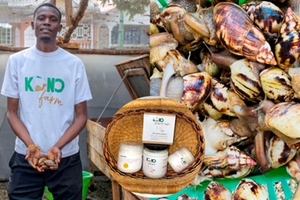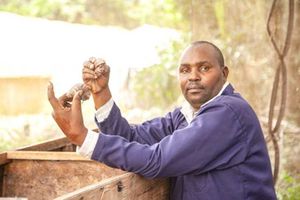
Benedetta Kyengo displays snails she breeds at her farm in Kwa Miui village, Kilome sub-County, Makueni County.
When many Kenyans spot a snail, their first reaction is to rush to the house and get salt that they sprinkle on the animal’s body. The salt dehydrates and kills the slimy creature.
Have you ever considered frying a snail and having it as your main dish or snack?
This may not be an option for many Kenyans, who look at the mollusc with disgust as it produces slime when moving around. Snail farming is still in its infancy. Many would not even think of trying a hand in it.
Dieticians, however, say snails are a good source of protein, iron, calcium and vitamin A. They suggest that Kenyans need to start thinking of including snails in their diet.
That is exactly what a farmer in Makueni County is doing. Snail farming or heliciculture has become a passion for Benedette Kyengo.
Kyengo considers heliciculture an agribusiness that will soon transform lives in Makueni and the rest of Kenya. She has been in the snail production business for about a year and is already witnessing its benefits and the possible impact on the region’s economy.
“Main snail meat buyers are foreigners. Some cook the snails while others make beauty products from it,” the farmer tells Seeds of Gold.
“Snails have for centuries been a delicacy in many countries, except East Africa. West Africans and Europeans are known to eat snails,” she says.
Kyengo, however, sees an increasing demand for snails as a potential source of food and income. Her farm is in Kwa Miui village, Kilome Sub-County. The farm receives visitors who are eager to get information on syntropic and regenerative agriculture.
Smaller animals
Kyengo had never imagined herself rearing and producing snails. She used to, and still grows a variety of crops sold at the local market. She mainly produces fruits and vegetables.
As visitors moved around, they would pluck a few fruits and eat. Kyengo says some fruits would be partially eaten while others had their exocarp left on the ground.
“An idea struck me on finding a way of disposing of what the visitors had thrown away,” she says.
Kyengo then thought of introducing snails on the farm to feed on the remains. Some of the fruit and vegetable remains were given to goats while others would be eaten by smaller animals.
“I then introduced snails to my farm to get their meat and slime. The animals help keep the farm clean because they eat leftovers,” she says.
She adds that heliciculture is not just about business but a solution to hunger and malnutrition. Kyengo settled on snail farming after identifying a market gap for the mollusc.
“Compared to other animals like chickens, goats, sheep, cattle, pigs and camels, snails are easier to care for. It is also economical to keep them,” she says.
The farmer adds that snail farming is sustainable as it does not emit methane, a gas that is widely blamed for climate change.
Kyengo supplies snail meat to customers in Nairobi and hotels that have it in their menu. Most of her clients are West Africans.
The slime, on the other hand, is used to make cosmetics and skin care products.
“Some experts say snail slime has anti-aging and anti-wrinkle components. It is used to make lotion and other body oils that people apply to look young,” Kyengo says.
She has noticed that snails reproduce a lot and fast.
“A snail can lay up to 200 eggs,” the farmer says.
The animals are confined in a cage at Kyengo’s farm. The cage, however, has a natural environment for the snails to thrive. This includes water points and shades to prevent dehydration. It also has loosened soil, with the environment being constantly damp.
The snails crawl on plants in the cage, laying eggs. Most of these animals are active at night.
They are fed on the remains of fruits and vegetables. The other organic waste is fed to black soldier flies, which are also on Kyengo’s farm.
“We plan to have another site for snails to prevent crowding. Snails generally are big feeders and their population in a confined space needs to be controlled,” the farmer says.
The farmer adds that a kilogramme of snail goes for Sh2,000.
“I have not succeeded in identifying the correct number of snails on the farm because of their high reproduction rate. They are, however, more than 500,” Kyengo tells Seeds of Gold, adding that she believes heliciculture will soon become popular in Kenya as farmers look for new ways of improving their income.
Experts say despite the production and rearing of the animal being relatively easy compared to mainstream livestock, many Kenyans have not considered snails as an asset.
Zachary Odero, an agronomist in Homa Bay says snail farming is new in Kenya and that its uptake has been slow.
He adds that many Kenyans take too long to embrace new ventures even when trained.
“Agriculture experts advise Kenyan farmers to explore new ideas but most of them are slow to change. Farmers find it difficult to abandon old ‘tried and tested’ technology,” Odero says.
He, however, tells farmers to take into consideration some factors before investing in new ideas, citing the market.
Snail meat
“What a farmer produces should be sold. This is one of the most important things to consider before attempting something new,” Odero advises.
Nutritionists say snail meat is as healthy as other foods. They advise Kenyans to reduce dependency on traditional sources of food.
According to Hillary Oracha, a nutritionist, snails are a good source of protein, magnesium and potassium. He adds that these nutrients help in muscle and nerve development.
Oracha says protein, magnesium and potassium are essential in men’s reproductive health.
“Potassium helps nerves to function properly and muscles to contract. It helps the heartbeat remain regular,” the nutritionist adds.
“Magnesium aids in the control of blood pressure and blood glucose levels. It also makes bones strong and supports one’s immune system.”
Oracha says heliciculture is a new concept in Kenya and that will take long before snail is accepted on tables in Kenya.
“A lot of advocacy and civic education is needed for Kenyans to start eating snails,” he says.
The awareness campaign, the expert adds, should include preparation of the meat before it is fit for consumption.
“Kenyans also need to be made aware of poisonous species of snails. I have not eaten snail but there is a possibility of that in the future.”
Apart from food, snails can also be used in the manufacture of medicines.
Snail shells have long been used as a source of calcium in animal feed. The shells are also used in artisanal crafts for decoration.










